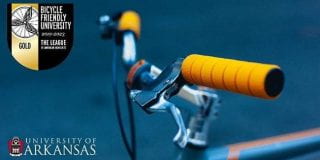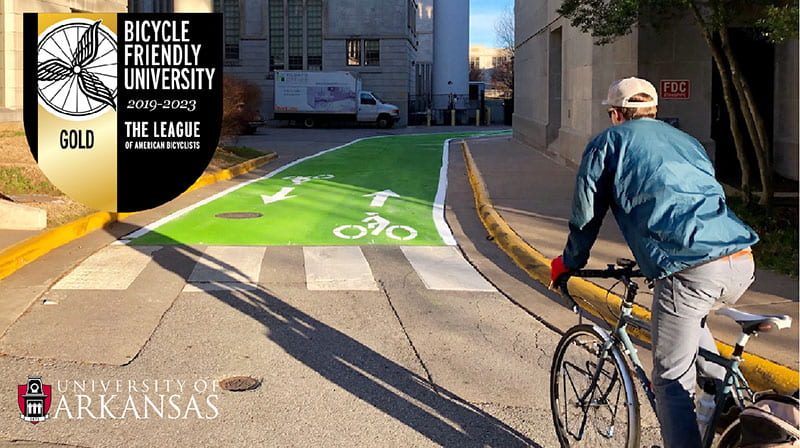University of Arkansas Strikes Gold
Each fall, The League of American Bicyclists evaluates applicants for its Bicycle Friendly University awards. The BFU program recognizes higher education institutions for promoting and providing a more bikeable campus for students, staff, and visitors. The most bike friendly campuses offer well-connected infrastructure, bike maintenance and storage options, theft prevention programs, biking skills classes, social biking events, and staffing to support better biking.
The U of A first applied for the Bicycle Friendly University Program in 2014 and received an honorable mention. In 2016, the University applied again and received Silver Status. Although the award is good for four years, Bicycle and Pedestrian Coordinator for The Office for Sustainability, Dane Eifling, decided to reapply a year early due to the University making significant strides in cycling infrastructure and culture. The League of American Bicyclists recently announced its Fall 2019 cohort in the BFU Program, granting the U of A Gold Status as a Bicycle Friendly University. This award ranks the University in select company, as only 24 other institutions have achieved Gold, including Colorado State University, Purdue University, and UCLA.
The Gold Standard
“To get this award really shows how much the University and our community have done to focus on making our campus environment one where people can bike safely and conveniently while contributing to healthier, more sustainable futures,” Dane Eifling said, Bicycle and Pedestrian Coordinator for the University of Arkansas and City of Fayetteville.
Efforts by the University of Arkansas to be designated as a Gold Status Bicycle Friendly University revolve around The League of American Bicyclists 5 E’s: engineering, education, enforcement, education, and encouragement. The Office for Sustainability recently conducted a survey of 1,500 campus affiliates and visitors. The survey shows a strong shift toward walking, biking, and transit and away from driving alone.
“Buses, bicycles, apartment shuttles and walking are all more efficient than driving alone and parking remotely. Most campus affiliates live within biking or walking distance of campus and due to the congestion around campus, its often faster to walk or ride a bike,” Eric Boles said, Director of the Office for Sustainability.
The Road to Gold
The University of Arkansas and Office for Sustainability, with assistance from The Walton Family Foundation, VeoRide, and other local organizations, have provided services and programs to enhance bicycling culture at the University of Arkansas. These programs and services are benefiting campus visitors as well as residents of the City of Fayetteville. Programs include: providing educational tools about bike safety and biking on campus at student resource fairs and the Farmer’s Market, organizing Slow Roll bike rides to encourage bike path familiarity for new and experienced riders, and creating a healthy space for cyclists of all levels.
In September of 2018, The City of Fayetteville and the University of Arkansas jointly contracted with the bike share company VeoRide to provide service to the University campus and the greater Fayetteville community. In the program’s first year, over 85,000 trips were taken by 8,700 users. The program launched with 290 pedal bikes and 50 e-assist bikes, and later added another 100 e-assist bikes to their fleet; totaling to 440 VeoRide bikes.
The University of Arkansas has created nearly a mile of natural-surface trails within the Oak Ridge hillside. This 3.5-acre wooded hillside is located between the Sam M. Walton College of Business and Clinton Street, home to a scenic multi-use paved path with eroded foot trails crisscrossing the landscape. The Oak Ridge is the first of three natural-surface trail installations on the U of A campus to be completed over the next couple of years. This new pocket in the campus core is supported by a Walton Family Foundation, with the U of A matching resources for site work and land allocation. The addition of the Oak Ridge trail system breaks barriers for students that once disconnected them from the Razorback Greenway. 
The Office for Sustainability has led the implementation of the Discovery Bikeway as a convenient shortcut for cyclists who want to avoid pedestrians during class change. This bikeway also provides a much safer path through the parking and loading zone. Green paint is used to raise awareness in potential conflict areas alerting cyclists and drivers to use caution. The University has several Bike Fix-it stations located around campus making it more convenient for cyclists to make small fixes to their bikes. The University also hosts a bike shop in room 102 of the HPER. Additionally, UREC Outdoors offers mountain and touring bike rentals ranging from a half day to a week. Anyone with a valid University ID may check out bikes, helmets, and bike racks.
What’s Next?
This award recognizes the progress made by The University and The City of Fayetteville to make transportation systems more sustainable and is a point of pride. The work is not over. While Gold status is excellent, the goal is to reach Platinum level, the highest award. Most of Fayetteville’s biking is done recreationally, and The League of American Bicyclists values transportation mode share. Efforts to increase the diversity of Fayetteville’s transportation systems are in action. University and City officials plan to construct a cycle track along Maple Street to better connect the campus to the Razorback Greenway.
Additionally, the Union Cyclist Internationale announced that the Cyclocross World Championships will be held at Millsap Mountain in Fayetteville in January 2022. This will be the second time the United States has ever hosted the event. Competitors from at least 30 nations are expected to travel to Fayetteville to compete at the event. This event is proof that efforts to make Fayetteville more bike friendly are not only recognized by nationally, but internationally as well.
